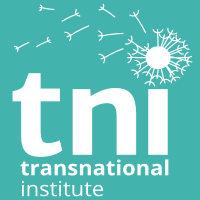Location
The Transnational Institute (TNI) is an international research and advocacy institute committed to building a just, democratic and sustainable world. For more than 40 years, TNI has served as a unique nexus between social movements, engaged scholars and policy makers.
The Transnational Institute (TNI) is an international research and advocacy institute committed to building a just, democratic and sustainable world.
Founded in 1974 as a network of ‘activist scholars’, TNI continues to be a unique nexus between social movements, engaged scholars and policy makers.
TNI has gained an international reputation for carrying out well researched and radical critiques and anticipating and producing informed work on key issues long before they become mainstream concerns, for example, our work on food and hunger, third world debt, transnational corporations, trade, and carbon trading.
As a non-sectarian institute, TNI has also consistently advocated alternatives that are both just and pragmatic, for example developing alternative approaches to international drugs policy and providing support for the practical detailed work of public water services reform.
TNI's Projects
TNI works on a wide range of interlinking issues. The constant interaction between fellows and projects gives TNI a unique, broad and informed perspective and enables a cross-disciplinary approach to complex global problems.
TNI's work currently includes:
- Leadership as a respected global voice on drugs policy, promoting a pragmatic approach to tackling illegal drugs based on harm reduction principles.
- Supporting a dynamic international network involved in building participatory, public sector water as the best way to achieve the goal of water for all
- Confronting the dogma of trade liberalisation, which like financial liberalisation has led to increased inequality, and helping to construct regional alternatives, such as the Bolivarian Alternative for the Americas, based on regional cooperation and solidarity
- Analysing and exposing the democratic dangers posed by the concentration of corporate power and proposing new legal frameworks of accountability for transnational corporations.
- Engaging with democratic innovations and experiments undertaken by social movements, progressive political parties and governments worldwide helping to empower communities to gain control over their lives and environment
- Drawing together and analysing the links between the different elements of the systemic crisis —financial, environmental and social.
Members:
Resources
Displaying 46 - 50 of 53A ‘Land Sovereignty’ Alternative? Towards a Peoples’ Counter-Enclosure
Argues the need to transition the people’s demand for land from ‘land reform’ and ‘land tenure security’ to ‘land sovereignty’. A peoples’ enclosure campaign is needed to help farmers to proactively assert their political control over their remaining lands against potential and actual threats of corporate or state enclosure.
Why peace and land security is key to Burma's democratic future - Interview with Tom Kramer
Analysis of the social costs of large-scale Chinese-supported rubber farms in northern Burma suggests that the future for ordinary citizens will be affected as much by the country's chosen economic path as the political reforms underway.
Financing Dispossession - China’s Opium Substitution Programme in Northern Burma
Northern Burma’s borderlands have undergone dramatic changes in the last two decades. Three main and
interconnected developments are simultaneously taking place in Shan State and Kachin State: (1) the increase
in opium cultivation in Burma since 2006 after a decade of steady decline; (2) the increase at about the same
time in Chinese agricultural investments in northern Burma under China’s opium substitution programme,
especially in rubber; and (3) the related increase in dispossession of local communities’ land and livelihoods
Land Grabbing
What rural dwellers in the Global South experience as land grabbing, tends to be seen in the Global North as ‘agricultural investment’. The World Bank has been at the forefront of a drive to legitimate these investments, convening to win support for a code of conduct based on Responsible Agricultural Investment (RAI) principles. Many key civil society groups reject the proposal for a code of conduct, objecting to the top-down process by which it was formulated and arguing that it was more likely to legitimate than prevent land grabbing.
Political Dynamics of Land-Grabbing in Southeast Asia: Understanding Europes Role
Abstract: "Land-grabbing is occurring at a significant extent and pace in Southeast Asia; some of the characteristics of this land grab differ from those in regions such as Africa. At a glance, Europe is not a high profile, major driver of land-grabbing in this region, but a closer examination reveals that it nonetheless is playing a significant role. This influence is both direct and indirect, through European corporate sector and public policies, as well as through multilateral agencies within which EU states are members.



